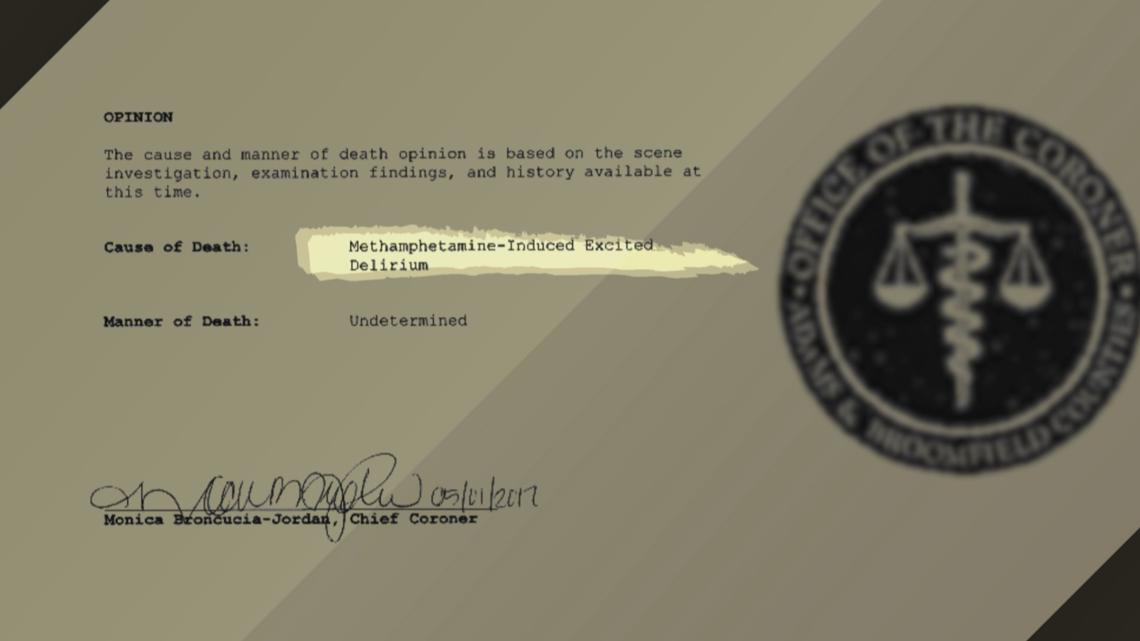ADAMS COUNTY, Colo. — Seven years after the Adams County coroner suggested “excited delirium” led to the death of a man who died under a pile of arresting officers in Thornton, an outside review of the case concluded the man likely died as a result of the officer’s actions.
The review, done at the request of 9NEWS Investigates and the man’s family, concluded that Alejandro “Alex” Gutierrez died not from the dubious medical condition but from homicide. The revelation raises serious concerns for the man’s family who never believed the original attempt to explain the death.
“There’s more to what happened,” said Gutierrez’s daughter, Avina De Luna. “When I saw my father’s body, I knew there was more.”
The development isn’t likely to lead to criminal charges, and the family will continue to face major legal hurdles trying to bring forth a civil lawsuit due to the passage of time, but it leads to more questions for a coroner’s office that has fiercely defended its use of the now-controversial term “excited delirium.”
“But for the restraint component, Mr. Gutierrez would not have died,” said Dr. Jan Gorniak, who has led thousands of autopsies all over the country in cities like Atlanta, Washington D.C., Las Vegas and Columbus, Ohio.
“I have no doubt this case is a homicide,” she said. “None.”
Death while held prone


Gutierrez was no saint. The night of his arrest in Thornton on March 16,2017, records reviewed by 9NEWS Investigates suggest he was selling drugs when a Thornton Police officer spotted him. A brief foot chase led to a fight between him and the arresting officers near West 91st Avenue and Huron Street.
The first officers on scene didn’t have body cameras at the time, but audio dispatch recordings show that Gutierrez, on at least two occasions, told officers, “I can’t breathe.”
Gutierrez was also held prone – or facedown – during the fight.
A review of the case by the local district attorney raised questions about the conduct of the officers.
A pair of Federal Heights Police officers who also responded had body cameras on, but neither activated them during the fight and restraint. Adams County District Attorney Dave Young called that “inexcusable” in his 2017 report on the death.
“Such blunders tend to fuel the public’s skepticism of law enforcement,” Young said in the report.
Each of the responding Thornton Police officers initially refused to take part in any interviews. Instead, they “demanded an opportunity to view all available evidence of the incident as a condition precedent to an interview. ... This evidence included the results of the autopsy,” read the Young report.
“Their initial refusal to do so threatens to diminish the trust and respect of those citizens that we are privileged and honored to serve,” Young said.
When firefighters arrived at the scene that night, one asked the officers whether Gutierrez had been hit by a car.
Despite his concerns, Young elected to clear everyone involved due, in no small part, to the Adams County coroner’s conclusion that something known as “methamphetamine induced excited delirium” killed Gutierrez. It was a term so foreign that De Luna, Gutierrez’s daughter, had to Google it when she first heard it.
“I had no idea what it was,” she said last year.


Early on, De Luna admitted to being skeptical. There was a footprint embedded in her father’s face, she said, when she viewed the body. Yet few outside her family cared. The case received scant attention in the media. Her emails and letters to elected leaders went ignored, she said.
“Excited delirium” caused her dad’s death to disappear. She was sure of it.
Ban on 'excited delirium'
A pair of 2017 deaths in Adams County formed the start of the 9NEWS Investigates “UNDETERMINED” series early last year. One was the death of Gutierrez. The other was the August 19, 2017, death of Paul Egli.
Both involved prone – facedown – restraint. 9NEWS received a 2021 Peabody Award for its investigation of how the commonly used restraint position can lead to death if officers hold people down for too long.
In both the Egli and Gutierrez deaths, the Adams County Coroner’s Office concluded “excited delirium,” and not the restraint, killed the two men.
Today, more than a year into the “UNDETERMINED” investigation, 9NEWS Investigates has tied 226 deaths to the term.
Built on a theory that the mind can become so delirious and the body so agitated that the heart suddenly stops, “excited delirium” has faced a major reckoning in recent years.
Critics long suggested it was used as a convenient excuse when someone dies after law enforcement restraint. Our investigation found almost all of the 226 identified deaths happened during or after physical or chemical restraint.
Dr. Joye Carter, an experienced, board-certified forensic pathologist, told 9NEWS in 2023 that “excited delirium” was no more than “a wastebasket term” that deserved to die.
As a result of our findings, in 2023, the Colorado’s Peace Officers Standards and Training Board elected to drop its required “excited delirium” training for all law enforcement officers in the state.
Earlier this year, again acting on the 9NEWS investigation, the Colorado legislature passed a ban on the use of the term on such things as autopsy and police reports. When the governor signed the bill in April, Colorado became just the second state in the country to effectively ban the term.
As of today, no major medical organization recognizes the term. Last year, the National Association of Medical Examiners told coroners to stop using the term on autopsy reports and death certificates moving forward.
For all intents and purposes, as of today, Carter looks to have gotten her wish. The term is effectively dead, as well.
Except on the police and autopsy reports of the 226 deaths we’ve identified.
'I can't ignore the restraint'


De Luna tried for more than a year to get Adams County Coroner Monica Broncucia-Jordan to review her father’s death. Each time, she was met with a “no.” She tried writing, visiting the office and reaching out to elected leaders in Adams County and across the state.
No one seemed interested.
Last year, 9NEWS Investigates reporter Chris Vanderveen and producer Chris Hansen began reaching out to forensic pathologists across the country looking for someone who might review the death on De Luna’s behalf.
In May, after months of negotiations and denials from the Adams County Coroner’s Office, Gorniak received the information she needed to reach a conclusion on the Gutierrez death.
Last week, Gorniak and De Luna met on a Zoom call to go over Gorniak’s findings.
“I would call his death a homicide,” Gorniak told De Luna. “I can’t ignore the restraint.”
“The manner of death, in my mind, would be a homicide and not undetermined,” Gorniak added.


De Luna called the words a “relief.”
“I just needed a second opinion from someone else who took the time to do their job and understand what happened to my father,” she said.
“Finally, someone is believing me,” she added.
The Adams County coroner, Broncucia-Jordan, has refused numerous requests for an on-camera interview on questions about her office’s handling of excited delirium deaths.
It’s important to note that even a “homicide” conclusion doesn’t necessarily mean a crime occurred. It simply means the death, in the mind of the author, happened as a result of another’s actions.
Ultimately, it remains up to local prosecutors to determine whether those actions were criminal in nature.
It’s common, for example, for police shootings – considered homicides – to be justified under the law.
If you have any thoughts on this story, please contact the author at chris.vanderveen@9news.com
RELATED: Coroners' group drops support of 'excited delirium,' placing coroners' offices in awkward position
RELATED: PRONE: Facedown and handcuffed is no way to die, yet it keeps happening over and over again
SUGGESTED VIDEOS: Investigations & Crime

